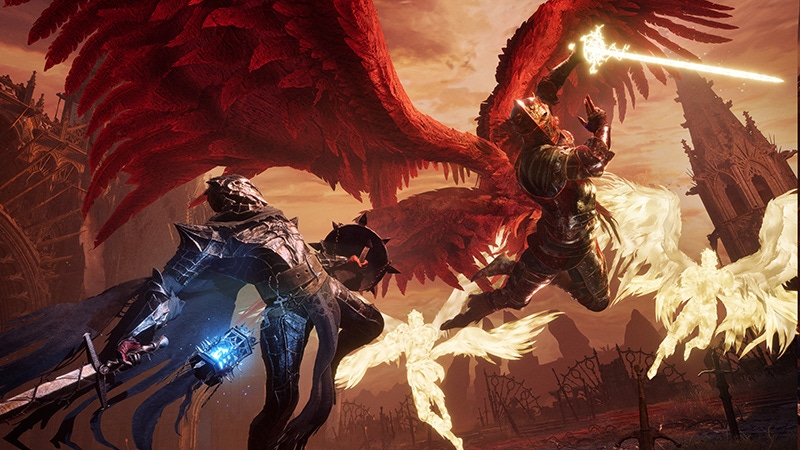Lords of the Fallen devs want to "improve the death cycle" of soulslike games
Lords of the Fallen may share a name with its 2014 predecessor, but it's trying new tactics to stand out in a sea of Dark Souls-inspired games.

After the monumental success of From Software's Dark Souls in 2010, many games sought to follow along with the growing popularity of challenging and stoically designed action RPGs—they came to be known as "soulslikes." One of the earliest soulslikes was 2014's Lords of the Fallen from developer Deck 13. Following a successful launch, publisher CI Games announced a sequel—though that game would take some time to see the light of day.
Coming nine years after the original, the follow-up from the newly established Barcelona-based developer Hexworks is a fresh start that aims to re-envision Lords of the Fallen, while adding its own twist on a soulslike that re-examines the familiar cycle of death. During a recent hands-on with the opening hours, we spoke with Hexworks studio head and executive producer Saul Gascon, along with creative director Cezar Virtosu about the importance of ensuring that this revisit to an early soulslike had an identity all its own.
Lords of the Fallen shares its predecessor’s name, but is a fresh start for the series
Much like the original 2014 game with a near-identical name, Lords of the Fallen (2023) is a dark-fantasy action RPG set in a world where the lines between life and death have blurred, placing a lone adventurer through a death-defying descent into macabre environments filled with demonic foes led by a resurrected demonic king. The protagonist—picked from various classes and backgrounds—gains the ability to use powers from the living realm of Axiom and the realm of the dead known as Umbral to purify lands and set things right.
Lords of the Fallen has had an interesting development period. Much like the sub-genre it adheres to, the reboot has seen its own cycle of rebirth since it was first announced. It began as a direct sequel to the original game in 2015, developed by a new studio picking up from Deck 13. However, the sequel underwent a round of reworks, leading to creative changes and different developers taking the lead. The game we have now is primarily built from scratch by Hexworks on Unreal Engine 5, sticking close to the dark-fantasy tone of the original but expanding upon the world's design and scope.
According to Hexworks studio head Saul Gascon, the current game is a culmination of years of reworking and listening to community feedback—but it's also a project that seeks to build an identity of its own as more than just a follow-up to the 2014 game.

"We've improved the gameplay and look of the game on so many fronts compared to the original that when we first made this game public, we made it clear that this was a full reboot—but it's part of the same world as the first game," said Gascon.
The developers also state that the latest technology with Unreal Engine 5 was a massive boon for helping to render the world itself. According to both Gascon and Virtosu, part of the reason for restarting development once Hexworks came on, was to get the newest game to use the latest technology to illustrate the atmosphere and texture of the world in richer detail, with an engine that was still evolving. At launch, Lords of the Fallen will be one of the first batch of UE5 games available.
"The tech gave us so much flexibility, allowing us to easily make changes and adapt, especially with Lumen, the real-time lighting feature, that ended up being the biggest win for our work pipeline," said Gascon about the development with the new engine. “We use it to increase the quality of the render, materials, textual objects, really everything. Using UE5 has really helped us with this game.”
Redefining life and death in a "soulslike"
Compared to the first, the reboot is a far more refined and responsive game with its combat mechanics and the number of options you develop for your character. It's a game that shows an awareness of the current trends that have been present in more recent Souls games, much more than the original's nascent framework of a burgeoning sub-genre. When playing this reboot, and getting settled into its revised flow, it felt closer in line with FromSoftware's work on the Souls games than with the original Lords of the Fallen.
The biggest twist Lords of the Fallen (2023) adds to the soulslike formula, taking it more into an adventure genre, is the horror-esque Umbral realm. With the developers citing Legend of Zelda: A Link to the Past and Legacy of Kain: Soul Reaver as influences, players can use a spectral lamp to peer into or shift briefly into the more hostile parallel realm of Umbral to reveal hidden objects, secret passages, and even new enemies that are not seen in the mortal world.
This additional realm not only introduces an element of advanced traversal and puzzle-solving to dungeons but also creates a buffer following a defeat. Once you die in the normal realm, you get kicked into the Umbral realm and have one last chance at a comeback. By stepping into the Umbral realm, you're seen as an invader, and Umbral foes will come at you, slowly, in numbers—which is seen in a wanted level-esque meter that gradually fills up. The only way to fully return to the moral realm is to retrieve your fallen body or defeat a boss that's taken up residence in the area.
It's an interesting change to a soulslike experience, giving players an added chance at redemption but with the added risk of having to persist in a ghostly parallel world. According to the creative director Cezar Virtosu, the balance of exploration and combat between the two realms intends to add new layers of strategy and challenge. Still, it also seeks to re-examine that familiar Souls-style cycle of death.

"We kind of play with the act of failure in this game, it's not just the death and restart loop," said the creative director. "Like you made a decision, then you got ambushed, and then you die. Like, it's okay, you just made a mistake in the game. What do you do next? Continually retry or withdraw. For us, that hit at the core of the dark fantasy we envisioned for this game. We discussed a lot about how to improve the death cycle before you see the 'game over.' So this is why Umbral, and the added layer of gameplay it brings, became the biggest point for us, we put in so much effort to get it right."
This twin realm mechanic and the soulslike formula truly came together for me during a boss fight against a cultist in a tomb. While evading and dodging their attacks, it became clear that the boss had protection from nearby foes using Umbral magic, rendering them invincible to my attacks. I was defeated soon after, and had to do that familiar Souls-style runback after a respawn to pick up where I left off.
However, getting back there was a tense sequence, as I had to fight through the Umbral realm's spectral atmosphere filled with enemy fodder to encounter the boss once again, and I eventually overcame them. Turning those familiar, quieter moments into harrowing fights for survival added a neat twist that gave me an appreciation for the world design and atmosphere the reboot is going for.
What's interesting about Lords of the Fallen is that it's coming out during a period when Souls games are now more common, with FromSoftware's Elden Ring taking the burgeoning sub-genre into the mainstream. With that Souls-style loop of exploration, death, rebirth, and repeat imprinted in many players, the developers at Hexworks see the reboot as a game that literally brings players more close to death than other games—even showing the need of being as close to it as possible in order to overcome the odds.
The idea of expecting death in a Souls game is familiar for audiences, but the reboot for Lords of the Fallen presents a different, and interesting direction for soulslikes. One that brings the familiar form of tense combat, challenge, and role-playing for the sub-genre, but adds in an element of balancing two different parallel worlds to navigate through. Seeing it all in action showed that it was a compelling twist on one of gaming's more infamous sub-genres, one that could give a new lease on life for one of the original soulslikes.
Read more about:
FeaturesAbout the Author
You May Also Like









